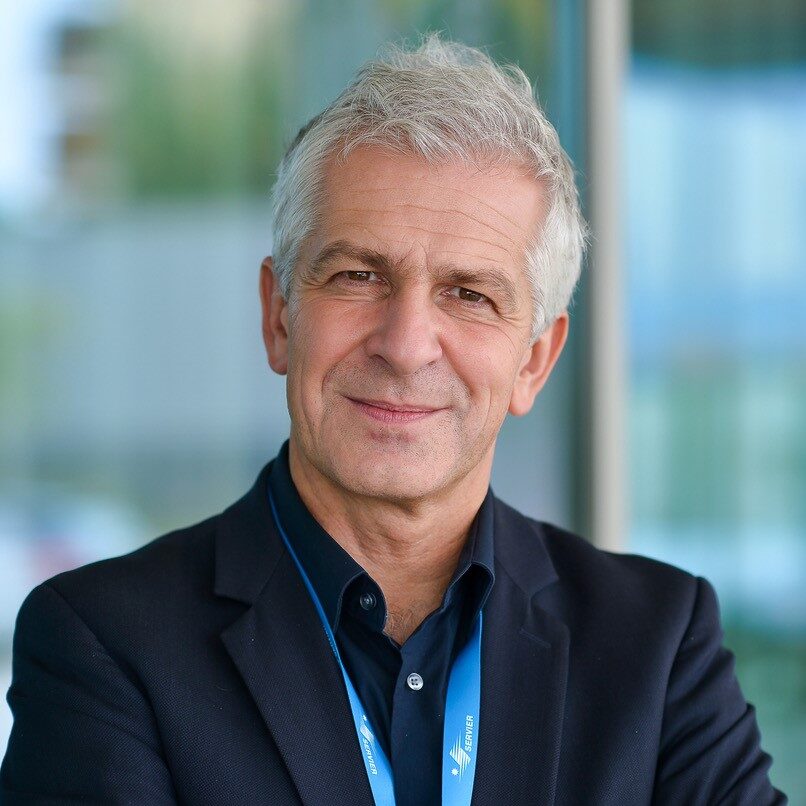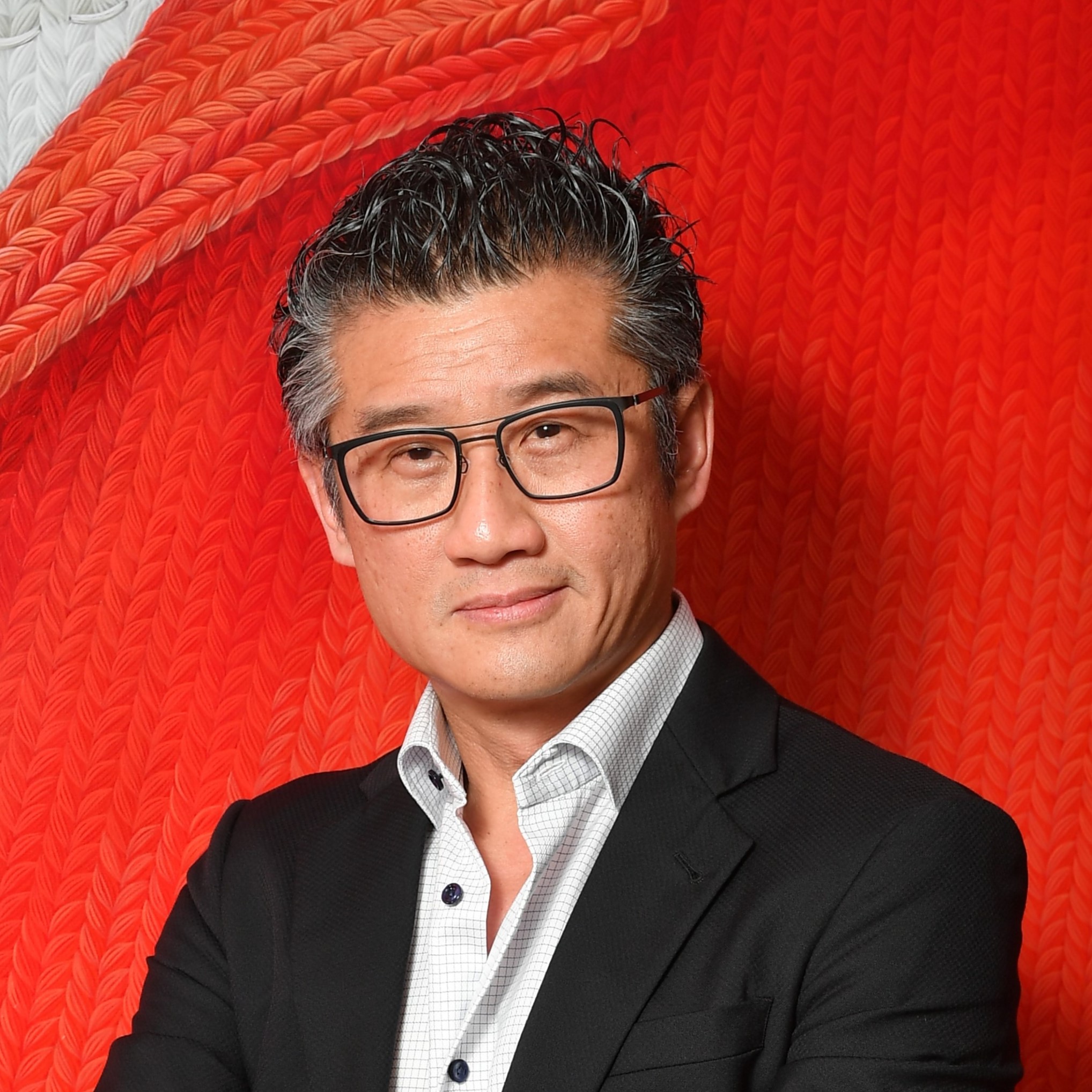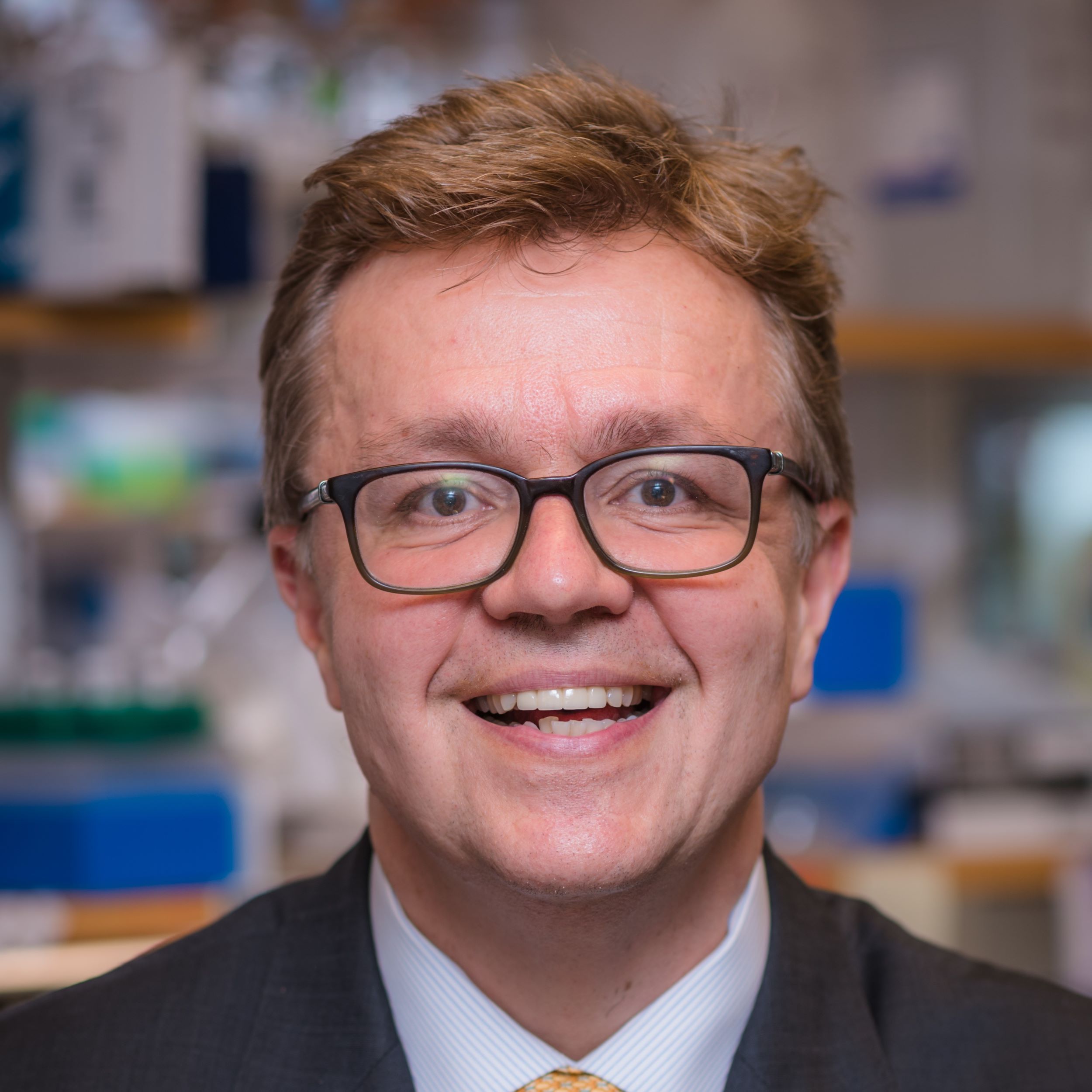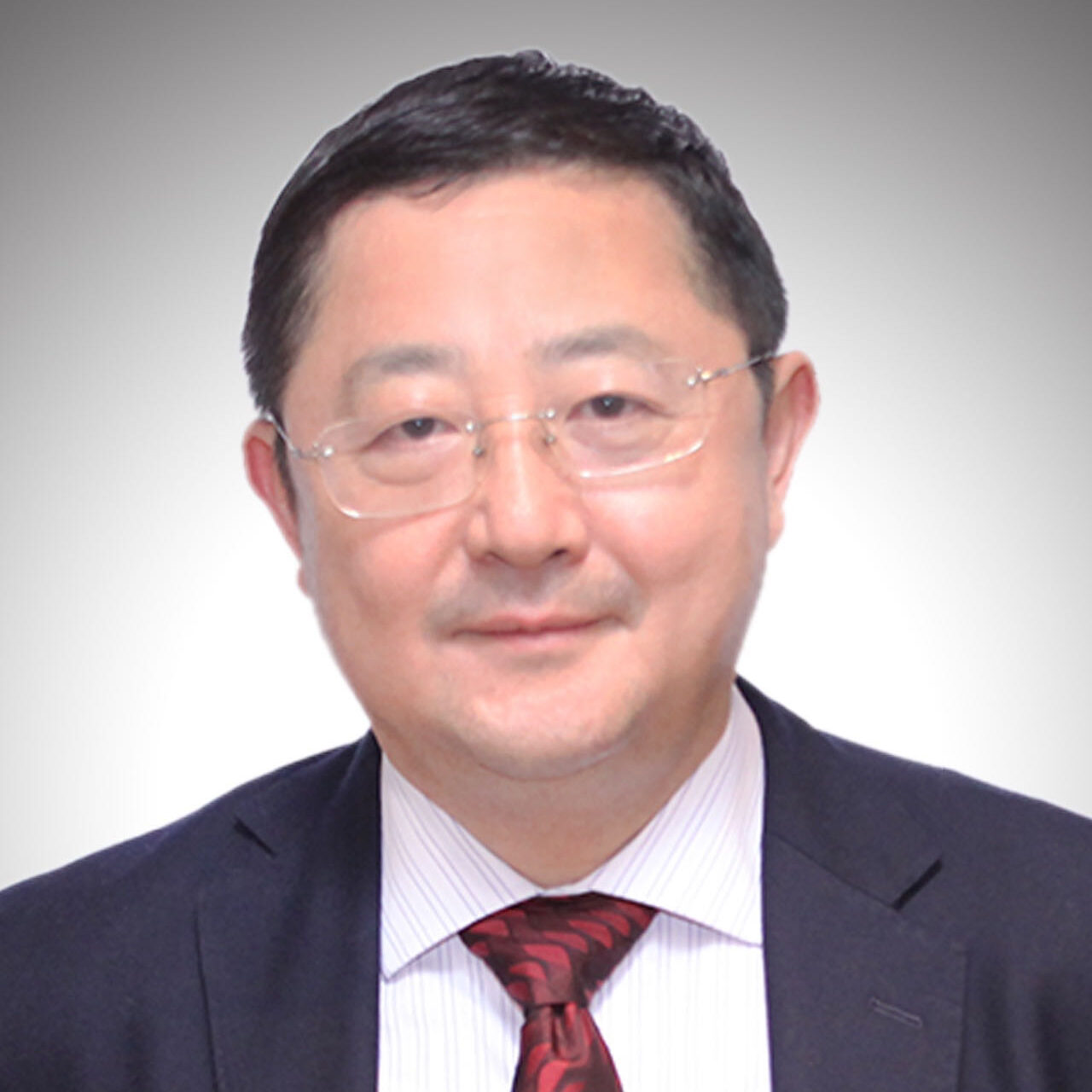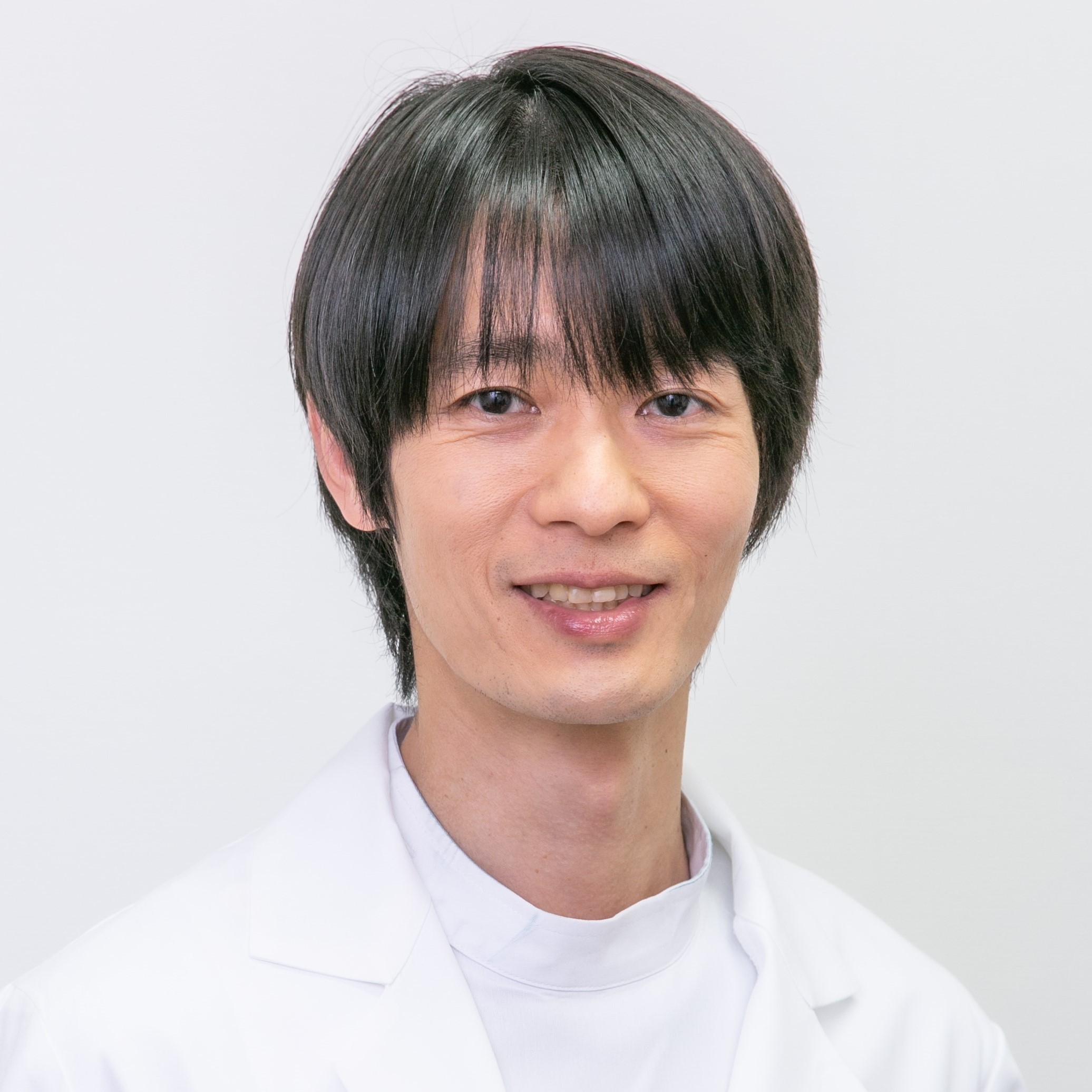Dirk Arnold completed his MD degree at the Universities of Ulm and Berlin in Germany, and he undertook specialist training at Charité, Humboldt University in Berlin.
Subsequently, he trained as a medical oncologist and specialist in palliative care at the Martin Luther University Halle-Wittenberg in Halle, Germany. In 2009, he qualified with a clinical PhD thesis on multimodal treatment aspects for colorectal cancer. He has held the positions of Professor and Chair of the Gastrointestinal Cancer Unit at the Martin Luther University Halle-Wittenberg. In 2010, he was appointed as Full Professor for Oncology at University Hamburg and held the position as Director of the University Cancer Center Hamburg until 2013, before he became Director of the Department of Medical Oncology of the Klinik für Tumorbiologie at University Freiburg. In 2015, he additionally got appointed as Director of oncology services at the Instituto CUF de Oncologia in Lisbon, Portugal – a position he held full time until 2017.
Since then (2017), Professor Arnold is holding the position as Director of Asklepios Tumorzentrum Hamburg, a large network Comprehensive Cancer Centre, and chairman of the Department for Oncology, Haematology and Rheumatology at AK Altona, Hamburg.
His main research interests include the treatment of gastrointestinal and genitourinary cancers, specifically in molecular-targeted therapies, immunotherapy, multimodal treatment strategies and early drug developments. He is also interested in research network structures and methodology of clinical research and benefit evaluation procedures, as well as in palliative and supportive care.
Prof. Arnold served as Chairman of the Colorectal Cancer Study Group of the Working Group for Internal Oncology (Arbeitsgemeinschaft Internistische Onkologie [AIO]). He initiated the Central Trial Office – which became later a non-for-profit-CRO – at the German Cancer Society (Deutsche Krebsgesellschaft), which he ran as CEO for several years, indicating his high interest in clinical research. He is a key member of several German and other international cancer societies, including the American Society of Clinical Oncology (ASCO) and European Society for Medical Oncology (ESMO), where he serves at various roles, including as an Executive Board member and Council member. Currently, he is serving as chairman of the ESMO Compliance Committee.
Within the ESMO Faculty, he served Section Editor for Gastrointestinal Cancers in the Guideline Committee until 2018, and (continued) as Subject Editor for Annals of Oncology, Gastrointestinal Cancer Track. He is also a member of the Task Force on Colorectal Cancer at the Gastrointestinal Cancer Study Group of the EORTC. He also served as an Executive Board member for the German Society of Haematology and Medical Oncology, as well as for the European CanCer Organisation (ECCO).
Dirk Arnold completed his MD degree at the Universities of Ulm and Berlin in Germany, and he undertook specialist training at Charité, Humboldt University in Berlin.
Subsequently, he trained as a medical oncologist and specialist in palliative care at the Martin Luther University Halle-Wittenberg in Halle, Germany. In 2009, he qualified with a clinical PhD thesis on multimodal treatment aspects for colorectal cancer. He has held the positions of Professor and Chair of the Gastrointestinal Cancer Unit at the Martin Luther University Halle-Wittenberg. In 2010, he was appointed as Full Professor for Oncology at University Hamburg and held the position as Director of the University Cancer Center Hamburg until 2013, before he became Director of the Department of Medical Oncology of the Klinik für Tumorbiologie at University Freiburg. In 2015, he additionally got appointed as Director of oncology services at the Instituto CUF de Oncologia in Lisbon, Portugal – a position he held full time until 2017.
Since then (2017), Professor Arnold is holding the position as Director of Asklepios Tumorzentrum Hamburg, a large network Comprehensive Cancer Centre, and chairman of the Department for Oncology, Haematology and Rheumatology at AK Altona, Hamburg.
His main research interests include the treatment of gastrointestinal and genitourinary cancers, specifically in molecular-targeted therapies, immunotherapy, multimodal treatment strategies and early drug developments. He is also interested in research network structures and methodology of clinical research and benefit evaluation procedures, as well as in palliative and supportive care.
Prof. Arnold served as Chairman of the Colorectal Cancer Study Group of the Working Group for Internal Oncology (Arbeitsgemeinschaft Internistische Onkologie [AIO]). He initiated the Central Trial Office – which became later a non-for-profit-CRO – at the German Cancer Society (Deutsche Krebsgesellschaft), which he ran as CEO for several years, indicating his high interest in clinical research. He is a key member of several German and other international cancer societies, including the American Society of Clinical Oncology (ASCO) and European Society for Medical Oncology (ESMO), where he serves at various roles, including as an Executive Board member and Council member. Currently, he is serving as chairman of the ESMO Compliance Committee.
Within the ESMO Faculty, he served Section Editor for Gastrointestinal Cancers in the Guideline Committee until 2018, and (continued) as Subject Editor for Annals of Oncology, Gastrointestinal Cancer Track. He is also a member of the Task Force on Colorectal Cancer at the Gastrointestinal Cancer Study Group of the EORTC. He also served as an Executive Board member for the German Society of Haematology and Medical Oncology, as well as for the European CanCer Organisation (ECCO).
Professor Tony Mok, BBS
BMSc, MD, FRCP(C), FRCP(Edin), FRCP(Lond), FHKCP, FHKAM(Medicine), FASCO, Member of ASHK
Professor Tony S.K. Mok was trained at the University of Alberta, Canada and he subsequently completed a fellowship in medical oncology at the Princess Margaret Hospital in Toronto. After working as a community oncologist in Toronto, Canada for seven years, he returned to Hong Kong in 1996 to pursue an academic career.
Professor Mok is the Li Shu Fan Medical Foundation endowed Professor and Chairman of Department of Clinical Oncology at The Chinese University of Hong Kong. His main research interest focuses on biomarker and molecular targeted therapy in lung cancer. He was the Principal Investigator and first author on the landmark IRESSA® Pan-Asia Study (IPASS), which was the first study that confirmed the application of precision medicine for advanced lung cancer. He has also led and co-led multiple international phase III studies including the FASTACT 2, PROFILE 1014, IMPRESS, ARCHER 1050, ALEX, AURA 3 and KEYNOTE 042. These projects address various aspects on management of advanced lung cancer, and basically have defined the current practice. He dedicates his work on precision medicine for lung cancer by also engaging in clinical research on oncogene driven lung cancer and immunotherapy. His work has been adopted by multiple international guidelines including NCCN, AMP/IASLC/CAP, ASCO and ESMO. He also contributes to the development of clinical research infra-structure in China and Asia. He cofounded the Lung Cancer Research Group, Chinese Thoracic Oncology Research Group and Asia Thoracic Oncology Research Group.
Professor Mok has contributed to over 308 articles in international peer-reviewed journals, including the New England Journal of Medicine, Science, Lancet, Nature Medicine and Journal of Clinical Oncology, and published multiple editorials and textbooks. He served as an Associate Editor for thoracic oncology for the Journal of Clinical Oncology and other international journals. He is the Past President, Past Treasurer of the International Association for the Study of Lung Cancer (IASLC) and Past Board of Director for ASCO. He is a member of the Board of Directors for ACTG-Sanomics Group, AstraZeneca, Aurora Tele-Oncology, HutchMed (China) and St. Stephen’s College & Preparatory School. He is active in international education activity and has made significant contributions to AACR, ASCO, CSCO and ESMO. His work was recognized by numerous awards including Bonnie Addario Award in 2015, Fellowship of the American Society of Clinical Oncology (FASCO) in 2017, Paul 2020, Jr Scientific Award in 2017, National Science and Technology Progress Award in 2017, CSCO Annual Achievement Award in 2017, ESMO Lifetime Achievement Award in 2018, The 6th Kobayashi Foundation Award, Giant of Cancer Care 2020 and SingTao Hong Kong Leader of the Year 2020 Award. His recent article in the New England Journal of Medicine has been selected as one of the most “Notable Articles in 2017”. He is one of the “Highly Cited Researchers” by Clarivate Analytics for four consecutive years from 2018 to 2022. He was awarded with the Bronze Bauhinia Star (BBS) by the Government of Hong Kong Special Administrative Region in 2022 to recognize his dedicated service in public affairs.
Professor Tony Mok, BBS
BMSc, MD, FRCP(C), FRCP(Edin), FRCP(Lond), FHKCP, FHKAM(Medicine), FASCO, Member of ASHK
Professor Tony S.K. Mok was trained at the University of Alberta, Canada and he subsequently completed a fellowship in medical oncology at the Princess Margaret Hospital in Toronto. After working as a community oncologist in Toronto, Canada for seven years, he returned to Hong Kong in 1996 to pursue an academic career.
Professor Mok is the Li Shu Fan Medical Foundation endowed Professor and Chairman of Department of Clinical Oncology at The Chinese University of Hong Kong. His main research interest focuses on biomarker and molecular targeted therapy in lung cancer. He was the Principal Investigator and first author on the landmark IRESSA® Pan-Asia Study (IPASS), which was the first study that confirmed the application of precision medicine for advanced lung cancer. He has also led and co-led multiple international phase III studies including the FASTACT 2, PROFILE 1014, IMPRESS, ARCHER 1050, ALEX, AURA 3 and KEYNOTE 042. These projects address various aspects on management of advanced lung cancer, and basically have defined the current practice. He dedicates his work on precision medicine for lung cancer by also engaging in clinical research on oncogene driven lung cancer and immunotherapy. His work has been adopted by multiple international guidelines including NCCN, AMP/IASLC/CAP, ASCO and ESMO. He also contributes to the development of clinical research infra-structure in China and Asia. He cofounded the Lung Cancer Research Group, Chinese Thoracic Oncology Research Group and Asia Thoracic Oncology Research Group.
Professor Mok has contributed to over 308 articles in international peer-reviewed journals, including the New England Journal of Medicine, Science, Lancet, Nature Medicine and Journal of Clinical Oncology, and published multiple editorials and textbooks. He served as an Associate Editor for thoracic oncology for the Journal of Clinical Oncology and other international journals. He is the Past President, Past Treasurer of the International Association for the Study of Lung Cancer (IASLC) and Past Board of Director for ASCO. He is a member of the Board of Directors for ACTG-Sanomics Group, AstraZeneca, Aurora Tele-Oncology, HutchMed (China) and St. Stephen’s College & Preparatory School. He is active in international education activity and has made significant contributions to AACR, ASCO, CSCO and ESMO. His work was recognized by numerous awards including Bonnie Addario Award in 2015, Fellowship of the American Society of Clinical Oncology (FASCO) in 2017, Paul 2020, Jr Scientific Award in 2017, National Science and Technology Progress Award in 2017, CSCO Annual Achievement Award in 2017, ESMO Lifetime Achievement Award in 2018, The 6th Kobayashi Foundation Award, Giant of Cancer Care 2020 and SingTao Hong Kong Leader of the Year 2020 Award. His recent article in the New England Journal of Medicine has been selected as one of the most “Notable Articles in 2017”. He is one of the “Highly Cited Researchers” by Clarivate Analytics for four consecutive years from 2018 to 2022. He was awarded with the Bronze Bauhinia Star (BBS) by the Government of Hong Kong Special Administrative Region in 2022 to recognize his dedicated service in public affairs.
Dr. Jänne is the Director of the Lowe Center for Thoracic Oncology at Dana-Farber Cancer Institute and a Professor of Medicine at Harvard Medical School and the David M. Livingston, MD Chair at Dana-Farber Cancer Institute. He is also the Director of the Belfer Center for Applied Cancer Science at the Dana-Farber Cancer Institute. After earning his MD and PhD from the School of Medicine at the University of Pennsylvania, Dr. Jänne completed his internship and residency in Medicine at Brigham and Women’s Hospital, Boston. He subsequently completed fellowship training at Dana-Farber Cancer Institute/Massachusetts General Hospital combined program in medical oncology in 2001. In 2002 he earned a Master’s Degree in clinical investigation from Harvard University.
Dr. Jänne’s research combines laboratory-based studies, with translational research and clinical trials of novel therapeutic agents in patients with lung cancer. His main research interests center around understanding and translating the therapeutic importance of oncogenic alterations in lung cancer. He has made seminal therapeutic discoveries, including being on one of the co-discoverers of EGFR mutations, and findings from his work has led to the development of several clinical trials. Dr. Jänne has received several awards for his work including from the American Association for Cancer Research, European Society for Medical Oncology and the American Society of Clinical Oncology.
Dr. Jänne is the Director of the Lowe Center for Thoracic Oncology at Dana-Farber Cancer Institute and a Professor of Medicine at Harvard Medical School and the David M. Livingston, MD Chair at Dana-Farber Cancer Institute. He is also the Director of the Belfer Center for Applied Cancer Science at the Dana-Farber Cancer Institute. After earning his MD and PhD from the School of Medicine at the University of Pennsylvania, Dr. Jänne completed his internship and residency in Medicine at Brigham and Women’s Hospital, Boston. He subsequently completed fellowship training at Dana-Farber Cancer Institute/Massachusetts General Hospital combined program in medical oncology in 2001. In 2002 he earned a Master’s Degree in clinical investigation from Harvard University.
Dr. Jänne’s research combines laboratory-based studies, with translational research and clinical trials of novel therapeutic agents in patients with lung cancer. His main research interests center around understanding and translating the therapeutic importance of oncogenic alterations in lung cancer. He has made seminal therapeutic discoveries, including being on one of the co-discoverers of EGFR mutations, and findings from his work has led to the development of several clinical trials. Dr. Jänne has received several awards for his work including from the American Association for Cancer Research, European Society for Medical Oncology and the American Society of Clinical Oncology.
Professor Lu is a leading clinician-scientist in the field of lung cancer. He is Professor and Chief of Shanghai Lung Cancer Center at Shanghai Chest Hospital, Shanghai Jiao Tong University. He holds an M.D. degree and a Ph.D. degree, and trained at MD Anderson Cancer Center in the United States and worked as a Visiting Professor there. He also completed a clinical oncology fellowship at Tel Aviv University in Israel.
Professor Lu’s research focuses on developing novel therapies for lung cancer. He has published extensive peer-reviewed papers which include over 90 papers as first or corresponding author, mostly in top journals such as Lancet Oncology, Lancet Respir Med., J Clin Oncol, Anal of Oncology, PNAS, Clin Cancer Res, Nat Commun., J Thorac Oncol, and JAMA Oncology. He has led over 80 clinical trials as PI or national coordinator on innovative drugs, including Opdivo (Nivolumab, anti PD-1 antibody), Tislelizumab (anti PD-1 antibody), Bevacizumab (anti-VEGF antibody), Savolitinib (c-MET inhibitor) and Almonertinib (EGFR TKI inhibitor).
Professor Lu serves in leadership roles for multiple international and Chinese clinical oncology societies, including Committee Member of ASCO’s Asia Pacific Regional Council, Standing Director & Deputy Secretary, Chinese Society of Clinical Oncology (CSCO), Commissioner of CSCO’s tumor biomarkers Committee, Board Member of Oncology Society Chinese Medical Association, and Board Member of Anticancer Association in China. He also served on the International Affairs Committee (IAC) of American Clinical Oncology Society (2008-2011) and MCMC Working Group (2008-2016). He currently serves on multiple editorial boards and committees of leading journals in the oncology field, including Associate Editor of Journal of Thoracic Oncology, Associate Editor of Lung Cancer and Editorial Board Member of the Oncologist.
Professor Lu has received numerous awards and honors including First Prize of Science and Technology Award of China Anti-cancer Association, First Prize of Shanghai Medical Science and Technology Award and First Prize of Shanghai Scientific and Technology Progress.
Professor Lu is a leading clinician-scientist in the field of lung cancer. He is Professor and Chief of Shanghai Lung Cancer Center at Shanghai Chest Hospital, Shanghai Jiao Tong University. He holds an M.D. degree and a Ph.D. degree, and trained at MD Anderson Cancer Center in the United States and worked as a Visiting Professor there. He also completed a clinical oncology fellowship at Tel Aviv University in Israel.
Professor Lu’s research focuses on developing novel therapies for lung cancer. He has published extensive peer-reviewed papers which include over 90 papers as first or corresponding author, mostly in top journals such as Lancet Oncology, Lancet Respir Med., J Clin Oncol, Anal of Oncology, PNAS, Clin Cancer Res, Nat Commun., J Thorac Oncol, and JAMA Oncology. He has led over 80 clinical trials as PI or national coordinator on innovative drugs, including Opdivo (Nivolumab, anti PD-1 antibody), Tislelizumab (anti PD-1 antibody), Bevacizumab (anti-VEGF antibody), Savolitinib (c-MET inhibitor) and Almonertinib (EGFR TKI inhibitor).
Professor Lu serves in leadership roles for multiple international and Chinese clinical oncology societies, including Committee Member of ASCO’s Asia Pacific Regional Council, Standing Director & Deputy Secretary, Chinese Society of Clinical Oncology (CSCO), Commissioner of CSCO’s tumor biomarkers Committee, Board Member of Oncology Society Chinese Medical Association, and Board Member of Anticancer Association in China. He also served on the International Affairs Committee (IAC) of American Clinical Oncology Society (2008-2011) and MCMC Working Group (2008-2016). He currently serves on multiple editorial boards and committees of leading journals in the oncology field, including Associate Editor of Journal of Thoracic Oncology, Associate Editor of Lung Cancer and Editorial Board Member of the Oncologist.
Professor Lu has received numerous awards and honors including First Prize of Science and Technology Award of China Anti-cancer Association, First Prize of Shanghai Medical Science and Technology Award and First Prize of Shanghai Scientific and Technology Progress.
Dr. Kohei Shitara is the Director of the Department of Gastrointestinal Oncology, National Cancer Center Hospital East, Kashiwa in Japan. He received his medical degree from Tohoku University School of Medicine in 2002. Dr Shitara is an active member of ASCO and ESMO. He is working as one of the ESMO faculty member for Gastrointestinal Tumors, Upper digestive faculty group for the period 2021-2025. He is one of the organising members for Japanese gastric cancer treatment guidelines. Main research interests include development of new anti-cancer agents, optimal chemotherapy regimen for gastrointestinal cancer, and translational research. He is the primary investigator or study coordinator of several sponsor-initiated trials or investigator-initiated trials for gastric or colorectal cancer. He acts as one of steering committee members of several ongoing global studies in the field of GI cancers. He has reported more than 200 peer review publications which include approximately 100 articles as 1st author or corresponding author in major journals (NEJM, Lancet, Nature, etc.). He was recognised as one of Highly Cited Researchers by Clarivate in 2022.
Dr. Kohei Shitara is the Director of the Department of Gastrointestinal Oncology, National Cancer Center Hospital East, Kashiwa in Japan. He received his medical degree from Tohoku University School of Medicine in 2002. Dr Shitara is an active member of ASCO and ESMO. He is working as one of the ESMO faculty member for Gastrointestinal Tumors, Upper digestive faculty group for the period 2021-2025. He is one of the organising members for Japanese gastric cancer treatment guidelines. Main research interests include development of new anti-cancer agents, optimal chemotherapy regimen for gastrointestinal cancer, and translational research. He is the primary investigator or study coordinator of several sponsor-initiated trials or investigator-initiated trials for gastric or colorectal cancer. He acts as one of steering committee members of several ongoing global studies in the field of GI cancers. He has reported more than 200 peer review publications which include approximately 100 articles as 1st author or corresponding author in major journals (NEJM, Lancet, Nature, etc.). He was recognised as one of Highly Cited Researchers by Clarivate in 2022.


